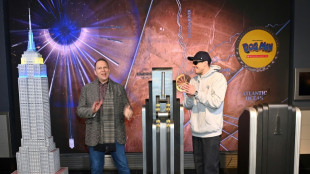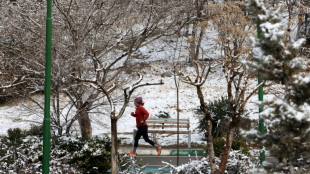
-
 Belgium's Detry marches to first PGA Tour title at Phoenix Open
Belgium's Detry marches to first PGA Tour title at Phoenix Open
-
Barca rout Sevilla to maintain title charge

-
 American Noh captures Founders Cup for first LPGA victory
American Noh captures Founders Cup for first LPGA victory
-
Marseille cement grip on second place in Ligue 1

-
 Uncertainty looms in Kosovo parliamentary polls
Uncertainty looms in Kosovo parliamentary polls
-
Barca rout Sevilla to mantain title charge

-
 Lillard carries short-handed Bucks over 76ers
Lillard carries short-handed Bucks over 76ers
-
Napoli miss chance to extend Serie A lead with Udinese draw

-
 Shapovalov wins ATP Dallas title with Ruud a third top-10 victim
Shapovalov wins ATP Dallas title with Ruud a third top-10 victim
-
Germany's Scholz, Merz, clash over far-right AfD in election debate

-
 Netanyahu praises Trump's 'revolutionary, creative' Gaza plan
Netanyahu praises Trump's 'revolutionary, creative' Gaza plan
-
Sweden's police struggle to find motive for mass shooting

-
 Macron beats French investment drum ahead of AI summit
Macron beats French investment drum ahead of AI summit
-
Defiant Postecoglou says Spurs can salvage season despite FA Cup exit

-
 Easterby proud of Prendergast as Six Nations champions Ireland overwhelm Scotland
Easterby proud of Prendergast as Six Nations champions Ireland overwhelm Scotland
-
Liverpool humbled by Plymouth, Villa beat Tottenham in FA Cup

-
 Giannis to miss NBA All-Star, likely won't return before then
Giannis to miss NBA All-Star, likely won't return before then
-
Lull in war-torn east DR Congo after truce call

-
 Plymouth boss Muslic celebrates Liverpool stunner with 'nachos and Fanta'
Plymouth boss Muslic celebrates Liverpool stunner with 'nachos and Fanta'
-
Sesko, Simons score as Leipzig rise to fourth

-
 'Dog Man' holds N.America lead despite Super Bowl competition
'Dog Man' holds N.America lead despite Super Bowl competition
-
Townsend upbeat about Russell and Graham after Scotland duo's head clash

-
 Liverpool 'hurt' by shock FA Cup exit, says Slot
Liverpool 'hurt' by shock FA Cup exit, says Slot
-
Chiefs chase Super Bowl 'three-peat' as Trump heads to NFL showpiece

-
 No Sinner, no sweat, says Rotterdam Open winner Alcaraz
No Sinner, no sweat, says Rotterdam Open winner Alcaraz
-
Six Nations kings Ireland again prove too much for Scotland

-
 Liverpool's quadruple dream ended by second-tier Plymouth
Liverpool's quadruple dream ended by second-tier Plymouth
-
Liverpool humbled as Plymouth claim shock FA Cup scalp

-
 Trump says Musk will help uncover 'hundreds of billions' in US govt fraud
Trump says Musk will help uncover 'hundreds of billions' in US govt fraud
-
Alcaraz muscles past De Minaur for Rotterdam Open title

-
 Fonseca notches first win in charge of Lyon
Fonseca notches first win in charge of Lyon
-
Lights out Rohit hits ton to power India to victory over England

-
 Tributes for Namibian independence leader Nujoma, dead at 95
Tributes for Namibian independence leader Nujoma, dead at 95
-
Li stays cool on last to win Qatar Masters

-
 Baltic nations 'successfully' link with European power grid
Baltic nations 'successfully' link with European power grid
-
Turkey detains three journalists over Istanbul prosecutor story

-
 Wolves ease into FA Cup fifth round
Wolves ease into FA Cup fifth round
-
Downhill world champion Von Allmen eyes Olympics - and sausage

-
 Baxter wants more from England after 'marquee win' over France
Baxter wants more from England after 'marquee win' over France
-
'Cool' Macron uses his deepfake videos to promote AI summit

-
 Iranian schools and offices shut as cold snap bites
Iranian schools and offices shut as cold snap bites
-
Baltic states 'successfully' link with European power grid

-
 Duckett, Root help Engand to 304 in second India ODI
Duckett, Root help Engand to 304 in second India ODI
-
Von Allmen upstages rivals to win world downhill gold

-
 AI app offers a lifeline for S.Africa's abused women
AI app offers a lifeline for S.Africa's abused women
-
Thai hostage freed from Gaza says feels 'reborn' after return home

-
 Use armed forces just for legitimate defence, says breathless pope
Use armed forces just for legitimate defence, says breathless pope
-
Sabalenka 'fully recovered' from Australian Open final loss

-
 Hamas says Israel withdraws from key Gaza road
Hamas says Israel withdraws from key Gaza road
-
'Anora' wins top Hollywood producer and director prizes

| AZN | -0.51% | 71.99 | $ | |
| GSK | -0.94% | 36.04 | $ | |
| SCS | -1.94% | 11.36 | $ | |
| RYCEF | -0.4% | 7.42 | $ | |
| NGG | -0.21% | 61.54 | $ | |
| RIO | -0.39% | 61.95 | $ | |
| RBGPF | 100% | 67.21 | $ | |
| BP | 0.96% | 32.27 | $ | |
| BTI | 0.34% | 41.76 | $ | |
| CMSC | -0.3% | 23.37 | $ | |
| BCC | -1.48% | 123.28 | $ | |
| VOD | 1.52% | 8.57 | $ | |
| CMSD | -0.34% | 23.75 | $ | |
| RELX | -0.82% | 49.99 | $ | |
| BCE | -6.23% | 22.14 | $ | |
| JRI | -0.16% | 12.81 | $ |

'Shocking' UK reality TV show retraces refugee journeys
Britain's newest reality TV show has been slammed as "insensitive", "voyeuristic" and even "nauseating" for recreating with six Britons the often fatal journeys made by thousands of refugees to the UK.
Bluntly titled "Go Back to Where You Came From", the part-documentary, part-reality TV show by Channel 4 follows the group of six, who hold strong views both for and against immigration.
They are divided into two teams, with one dropped into one war-ravaged Raqqa in Syria and the other sent to Mogadishu in Somalia.
Over four episodes which launched on February 3, they "experience some of the most perilous parts of the refugee journeys" according to Channel 4 -- although they travel largely in armoured vehicles.
The outspoken views of some participants, as well as the show's format, have been criticised by viewers, charities and some media.
Amnesty International UK called it "deeply disappointing" and "sensational".
Participant and chef Dave Marshall, 35, opens the series standing on the cliffs of Dover, calling for immigrants crossing the Channel to be "blown up".
Moments later, political commentator Chloe Dobbs, 24, says that unless immigration is reined in "Britain will be a hellhole full of people wearing burqas".
In the first episode, the six are taken to markets where they meet families, play football with kids and accompany them as they search through litter for scraps.
At one point, when they visit a bombed-out family home in Raqqa, Marshall and two others are invited to stay the night.
"Very kind of you for offering your house to us," replied Marshall, the irony perhaps lost on him.
"The series explores the varied and sometimes polarised opinions in our society in a fresh way," a series spokesperson said.
In upcoming episodes, both groups undertake "challenges", including a boat crossing and trekking through a Libyan desert. There is no winner of the series though.
- 'Outrageous opinions' -
The reality TV genre "exists and its success depends on actually performing shocking opinions", said Myria Georgiou, media and communications professor at the London School of Economics.
"I'm sure the contestants are competing for that shock element -- who is going to be more extreme in their opinions," Georgiou told AFP.
Dobbs defended it as a "really fun show that lots of people will tune into".
"More so than just some bog-standard, boring documentary," she said.
"Go Back to Where You Came From" is based on a popular Australian series which first ran in the early 2010s.
At around that time, politicians in Australia were campaigning to "stop the boats" of irregular migrants reaching the country.
A decade later, the same catchphrase has been seized upon by politicians opposing asylum seekers crossing the Channel to reach Britain.
The timing of the British version did not surprise Georgiou.
"You have the political leadership, nationally and globally, that have made the most outrageous opinions mainstream," said Georgiou.
"We can see that politics have become entertainment and thus it's no surprise that entertainment has become politics."
Some viewers have praised Channel 4 for giving a rare primetime spot to the hot-button immigration debate, with British charity Refugee Council "welcoming" the show's premise.
"Television shows have huge potential to highlight the human stories behind the headlines," Refugee Council CEO Enver Solomon said.
- 'Humanitarian tragedy' -
In one heavily criticised "challenge", the group get into a dinghy in a simulation of the often fatal Channel crossings.
For Dobbs, who has previously said small boats were made out to be "fun" by some refugees, getting into a flimsy vessel in the middle of the night was a turning point.
"It was that moment for me that it really hit me. Gosh, people must be really desperate to get on these boats," she acknowledged.
However, clips of the simulation sparked outrage across the Channel, with French politician Xavier Bertrand calling for the "nauseating" show to be cancelled.
"Hundreds of people have died in the Channel in recent years. This situation is a humanitarian tragedy, not the subject of a game," Bertrand said on X.
The number of asylum seekers arriving in Britain on small boats after crossing the Channel rose to more than 36,800 in 2024, according to official data.
It was also the deadliest year for migrant crossings, with at least 76 deaths recorded.
According to Dobbs, the show wanted to do something "different".
"Rather than just talking to a migrant about what the boat crossing they did was like, wouldn't it be even better to simulate it and feel all those emotions for yourself?"
"And if it makes it more entertaining and more intriguing for the audience and means that more people tune in, I mean, that's a win-win," Dobbs added.
H.Thompson--AT
